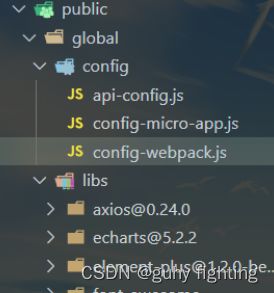qiankun 公共依赖
1、提取公共依赖的目的
减少相同资源的重复加载
资源版本不同步
打包文件庞大
2、如何提取公共依赖
基本思路:
1、相同依赖 采用 CDN 的方式加载,并把 所有依赖的 CDN 链接 统一放到一个文件中进行管理
2、把存放 CDN 链接的文件,引入到 vue.config.js 中去
3、在项目打包时,添加忽略部分文件打包的配置,把以CDN方式加载的依赖忽略掉
4、把CDN加载的链接,动态添加到 index.html 中去
2.1 改造主应用
2.1.1 修改目录、添加配置文件及资源
在主应用的 public 下新建 global > config 文件夹,用于存放 全部应用公共接口地址配置、微应用配置、公共依赖 CDN 地址 等内容
在 config 文件夹下 新建 api-config.js,用于存放全部应用公共接口地址配置
在 config 文件夹下 新建 config-micro-app.js,用于存放微应用配置
在 config 文件夹下 新建 config-webpack.js,用于存放公共依赖 CDN 地址
在主应用的 public 下新建 libs 文件夹,用于存放各种依赖包

2.1.2 config-webpack.js 中,导出公共依赖地址配置
微应用中的依赖,就是读取主应用中的 config-webpack.js 这个配置文件
把项目打包部署到服务器上,public 文件夹内容不会被打包改变;因此线上项目的 public/libs 文件夹中就是依赖,依赖包的在线地址就能拿到了
// CDN 链接(读取线上配置)
exports.cdn = {
css: [
'http://192.xxxx/xxxx-app/global/libs/[email protected]/theme-chalk/index.css',
'http://192.xxxx/xxxx-app/global/libs/font-awesome/4.7.0/css/font-awesome.min.css',
'http://192.xxxx/xxxx-app/global/styles/variable.css',
],
js: [
'http://192.xxxx/xxxx-app/global/libs/[email protected]/vue.global.js',
'http://192.xxxx/xxxx-app/global/libs/[email protected]/vue-router.global.js',
'http://192.xxxx/xxxx-app/global/libs/[email protected]/vuex.global.js',
'http://192.xxxx/xxxx-app/global/libs/[email protected]/axios.min.js',
'http://192.xxxx/xxxx-app/global/libs/[email protected]/index.full.min.js',
'http://192.xxxx/xxxx-app/global/libs/[email protected]/echarts.js',
// 这里引入了公共接口配置
'http://xxxx/xxxx-app/global/config/api-config.js',
],
};
// Webpack 打包时,如果使用 CDN 链接引入,则构建时要忽略相关资源
exports.externals = {
vue: 'Vue',
'vue-router': 'VueRouter',
vuex: 'Vuex',
axios: 'axios',
'element-plus': 'ElementPlus',
echarts: 'echarts',
};
2.1.3 api-config.js
const appConfig = {
jdpAppCode: 'DCP.DSM',
jdpOuApiContext: 'http://xxxx/ou',
jdpBpmApiContext: 'http://xxxx/bpm',
}
2.1.4 config-micro-app.js:
window.microApp = [
{
name: 'river-micro-app',
entries: {
dev: '//localhost:7081/',
product: '//192.xxxx/xxxx-app/',
},
container: '#micro-app',
activeRule: '#/layout',
},
];
2.2 添加微应用配置
2.2.1 同步获取在线文件(require-from-url)
微应用中采用 require-from-url 第三方依赖,实现同步获取在线文件(从节点中的URL加载模块)
2.2.2 读取线上 Webpack 配置文件
在 vue.config.js 中,添加如下代码:
// 同步获取在线JS
const requireFromUrl = require('require-from-url/sync');
// 微应用 - 读取线上 Webpack 配置文件(CDN 地址配置、忽略打包文件配置)
const webpackOnline = 'http://localhost:xxxx/global/config/config-webpack.js';
const { cdn, externals } = requireFromUrl(webpackOnline);
2.2.3 生成一个 HTML5 文件(html-webpack-plugin)
2.2.4 修改 vue.config.js
增加打包忽略 CDN 依赖文件的配置代码
把 CDN 链接,注入到 htmlWebpackPlugin 里(htmlWebpackPlugin 主要是生成 html 的,在 html 中可以拿到它的值)
// 同步获取在线JS
const requireFromUrl = require('require-from-url/sync');
const { name } = require('./package');
// 微应用 - 读取线上的 Webpack 配置文件(CDN 地址配置、忽略打包文件配置)
const webpackOnline = 'http://localhost:8083/global/config/config-webpack.js';
const { cdn, externals } = requireFromUrl(webpackOnline);
// 判断是否是生产环境
const isProd = process.env.NODE_ENV === 'production';
// 静态资源的公共地址,部署到生产环境时,按需修改前项为项目名称(其中name为项目名称)
const publicPath = isProd
? `http://localhost:9160/${name}/`
: 'http://localhost:8081';
module.exports = {
devServer: {
port: 8081,
headers: {
'Access-Control-Allow-Origin': '*',
},
},
publicPath,
// 自定义 Webpack 配置
configureWebpack: (config) => {
// 生产环境
if (isProd) {
// 去除 console
Object.assign(
config.optimization.minimizer[0].options.minimizer.options.compress, {
drop_console: true,
},
);
}
return {
externals, // 打包时忽略这些依赖
output: {
library: `${name}-[name]`,
libraryTarget: 'umd', // 把子应用打包成 umd
},
};
},
chainWebpack: (config) => {
config.plugin('html').tap((args) => {
// 在 html 中,注入 CDN 链接
args[0].cdn = cdn;
return args;
});
},
};
2.2.5 修改微应用 public > index.html
<!DOCTYPE html>
<html>
<head>
...
<!-- 使用 CDN 的 CSS、JS 文件 -->
<% for (var i in htmlWebpackPlugin.options.cdn && htmlWebpackPlugin.options.cdn.css) { %>
<link href="<%= htmlWebpackPlugin.options.cdn.css[i] %>" ignore rel="stylesheet">
<% } %>
<% for (var i in htmlWebpackPlugin.options.cdn && htmlWebpackPlugin.options.cdn.js) { %>
<script src="<%= htmlWebpackPlugin.options.cdn.js[i] %>"></script>
<% } %>
</head>
</html>
2.3 添加主应用配置
2.3.1 修改 vue.config.js
const { name } = require('./package');
// 主应用 - 读取本地的 Webpack 配置文件(CDN 地址配置、忽略打包文件配置)
const { externals, cdn } = require('./public/global/config/config-webpack');
// 判断是否是生产环境
const isProd = process.env.NODE_ENV === 'production';
// 静态资源的公共地址,部署到生产环境时,按需修改前项为项目名称(其中name为项目名称)
const publicPath = isProd ? `/${name}/` : '/';
module.exports = {
devServer: {
port: 8081,
},
publicPath,
// 自定义 Webpack 配置
configureWebpack: (config) => {
// 生产环境
if (isProd) {
// 去除 console
Object.assign(
config.optimization.minimizer[0].options.minimizer.options.compress, {
drop_console: true,
},
);
}
return {
externals, // 打包时忽略这些依赖
};
},
chainWebpack: (config) => {
config.plugin('html').tap((args) => {
// 在 html 中,注入 CDN 链接
args[0].cdn = cdn;
return args;
});
},
};
2.3.2 修改主应用 public > index.html
<!DOCTYPE html>
<html>
<head>
...
<!-- 使用 CDN 的 CSS、JS 文件 -->
<% for (var i in htmlWebpackPlugin.options.cdn && htmlWebpackPlugin.options.cdn.css) { %>
<link href="<%= htmlWebpackPlugin.options.cdn.css[i] %>" ignore rel="stylesheet">
<% } %>
<% for (var i in htmlWebpackPlugin.options.cdn && htmlWebpackPlugin.options.cdn.js) { %>
<script src="<%= htmlWebpackPlugin.options.cdn.js[i] %>"></script>
<% } %>
</head>
</html>
2.4 子应用复用主应用的组件
主应用main.js 中加入
import VueUeditorWrap from 'vue-ueditor-wrap'
window.commonComponent = { VueUeditorWrap };
子应用改成:
VueUeditorWrap: window.__POWERED_BY_QIANKUN__ ? window.commonComponent.VueUeditorWrap : import('vue-ueditor-wrap')